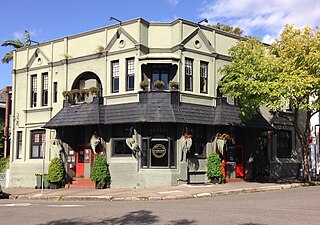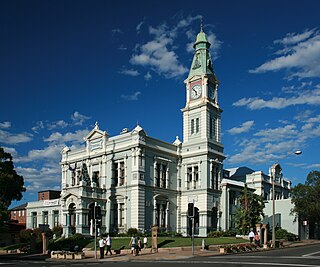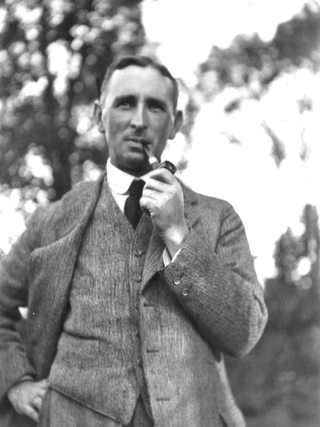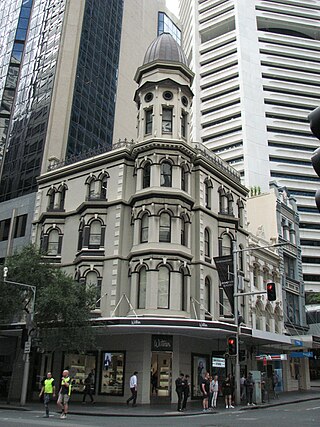
Kirribilli House is the secondary official residence of the prime minister of Australia. Located in the Sydney harbourside suburb of Kirribilli, New South Wales, the house is at the far eastern end of Kirribilli Avenue. It is one of two official Prime Ministerial residences, the primary official residence being The Lodge in Canberra, Australian Capital Territory. The house, gardens and grounds are listed on the Commonwealth Heritage List.

Balmain is a suburb in the Inner West of Sydney, New South Wales, Australia. Balmain is located two kilometres west of the Sydney central business district, in the local government area of the Inner West Council.

Bourke is a town in the north-west of New South Wales, Australia. The administrative centre and largest town in Bourke Shire, Bourke is approximately 800 kilometres (500 mi) north-west of the state capital, Sydney, on the south bank of the Darling River. it is also situated:

Erskineville is a suburb in the Inner West of Sydney, New South Wales, Australia. It is located 6 kilometres south west of the Sydney central business district and is part of the local government area of the City of Sydney. Erskineville is a diverse suburb homing to a wide variety of ethnicity from its varying Southeast Europe and Aboriginal community. Erskineville is colloquially known as Erko.

Waverley Council is a Local government area in the eastern suburbs of Sydney, in the state of New South Wales, Australia. First incorporated on 16 June 1859 as the Municipality of Waverley, it is one of the oldest-surviving local government areas in New South Wales. Waverley is bounded by the Tasman Sea to the east, the Municipality of Woollahra to the north, and the City of Randwick in the south and west. The administrative centre of Waverley Council is located on Bondi Road in Bondi Junction in the Council Chambers on the corner of Waverley Park.

A coffee palace was an often large and elaborate residential hotel that did not serve alcohol, most of which were built in Australia in the late 19th century.

The Sir William Wallace Hotel was an historic pub in the suburb of Birchgrove on the Balmain Peninsula in the inner west region of Sydney, in the state of New South Wales, Australia.

The Volunteer Hotel was a pub in the suburb of Balmain in the Inner West of Sydney, in the state of New South Wales, Australia.

The Riverview Hotel is a heritage-listed pub located in Balmain, a suburb in the inner west region of Sydney, in the state of New South Wales, Australia. Australian swimming champion, Dawn Fraser, was publican of the Riverview from 1978 to 1983.

Hong Kong House, also known since 1995 as the Hong Kong Economic and Trade Office, Sydney, is a landmark heritage building and former hotel in the Sydney central business district, City of Sydney, New South Wales, Australia. Built in 1891 to a design by Ambrose Thornley, it is located on 80 Druitt Street, at the corner with York Street, and is adjacent to other prominent heritage landmarks, the Sydney Town Hall and the Queen Victoria Building. Formerly known as Gresham Hotel, the property was added to the New South Wales State Heritage Register on 2 April 1999.

Laggan is a small village on the traditional land of the Gundungurra people in the Southern Tablelands, New South Wales, Australia in Upper Lachlan Shire. At the 2016 census, Laggan had a population of 358.

The Shipwright's Arms is an historic de-licensed pub located in Balmain East, a suburb in the inner west region of Sydney, in the state of New South Wales, Australia. The former pub looks out across Sydney Harbour to the Sydney Harbour Bridge and currently houses luxury apartments.

The Leichhardt Town Hall is a landmark civic building in Leichhardt, a suburb of Sydney, Australia. It stands at 107 Norton Street. It was built in 1888 in the Victorian Italianate style by architects Drake and Walcott. The Town Hall was the seat of Leichhardt Municipal Council from 1888 to 2016 and is now one of the seats of the new Inner West Council. The hall is listed on the Australian Register of the National Estate and the local government heritage database.

Thomas Pollard Sampson was a Tasmanian-born Australian architect active in New South Wales during the first forty years of the 20th century. His work encompassed the styles of the Federation Arts and Crafts and Bungalow through to the Inter-War Styles. In 1912 he designed an octagonal roofed stadium at Rushcutters Bay that seated up to 12,000 spectators. At the time, the Sydney Stadium was said to be "the largest roofed-in structure in the world." In the 1920s and 1930s, as a golfer and member of Concord Golf Club and Pennant Hills Golf Club, he designed the clubhouses at both courses. The buildings of both these well known Sydney clubs are still in use in 2023.

Kings Hotel is a heritage-listed former pub and now commercial premises located at 138–140 Pitt Street, in the Sydney central business district, in the City of Sydney local government area of New South Wales, Australia. It was built from 1879. It is also known as Trickett's Hotel and Sugar House. It was added to the New South Wales State Heritage Register on 2 April 1999.
Lalla Rookh was a clipper/brig variously recorded as 184 tons and 147 tons, built in Peterhead, Aberdeenshire, Scotland in 1848. She was described as one of the "new Aberdeen clippers".
William Dind was an hotelier and theatre manager in Sydney, Australia, where he was the longtime lessee of the Royal Victoria, and Prince of Wales theatres. He settled on Sydney's North Shore, where he was active in local government, and he and his son William Forster Dind, aka W. Forster Dind or William Dind jun, ran hotels which were popular with theatrical people.
Arthur John Mason was an Australian organist and journalist, remembered as Sydney City Organist from 1901 to 1907, when he moved to London as correspondent for the Sydney Morning Herald. He was a son of George Birkbeck Mason, musician and entrepreneur, and grandson of Abraham John Mason, wood engraver of London and New York.
Alexander Rea, commonly referred to as Alex Rea, was an English clergyman who had a career as an organist in Australia. He was responsible for ordering the Sydney Town Hall Grand Organ and supervising its construction.

















